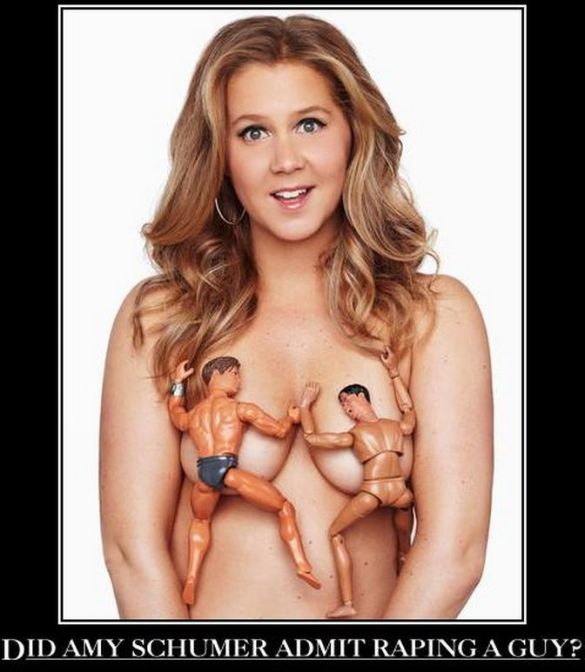It’s just harder to be a woman in general, and you get treated differently in the world in general. Everyone deals with you a little differently. But I can’t complain about being a female comedian. For me, I can’t say it’s been harder. I’ve had a really nice road to where I am now and I’ve worked really hard and it’s paid off. –Amy Schumer
It’s just harder to be a woman. This seems to be the premise underlying most of Amy Schumer’s comedy. Going through a synopsis for each of her TV show episodes is like reading a litany of feminist grievances about how it’s so much harder to be a woman.
There’s the usual whining about menstrual cycles. And she does a lot of whining. There is a heaping helping of how women struggle with body image and how women’s bodies are objectified. There are complaints about double standards—one for sluts and another for studs. There seems to be a lot of comedy about sexually transmitted diseases. And, of course, rape is a topic in her comedy.
Amy coined the term “grape” in one of her comedy routines. The term references the so-called gray area of rape. Schumer describes this gray area in her own words:
“It’s not whether or not something is rape. It’s the gray area of how to handle it. It’s not always black and white, ‘he did that and he’s going to jail.’ It’s a really hard decision—how to handle it. Every girl I know has had a sexual experience that they’re really uncomfortable with, that was really questionable. In some cases it was absolutely rape, but they didn’t think it was the best idea for them to try to prosecute it.
So when I say the part of that joke—which I don’t say anymore because I did it on the show—‘some guys think a girl sleeping is a suggested no. That’s a no!’ When I say that, the whole joke is the hope that maybe a guy will hear that joke and know that this isn’t ok, because that comedian talked about it. And a girl will hear it and feel less alone, because she knows that it happens to other people. That’s my goal with that joke. I would never just make a rape joke to make a rape joke. It needs to have a point and be really funny. I think rape is the most horrible thing you can think of and that’s why people use it as a punch line.”
It’s all a very clever and comedic way in which to draw attention to some of the complex problems women face in regards to rape. According to Schumer, it’s also a very personal issue. During one of her appearances on “The Opie & Anthony Show,” she described her first sexual experience as rape, saying “one of my boyfriends kind of raped me. That’s kind of how I lost my virginity…I was like seventeen, hahah…we were drinking and hanging out and then I passed out and I woke up…and I go ‘what are you doing!’…I woke up to him having sex with me…We went and visited a college together the next day.”
She goes on to describe another gray area, saying “This never happened to me, but they’re like starting sex…and the girl falls asleep and the guy finishes. That’s a gray area… I don’t know. I’ve never fallen asleep, but I’ve had like two guys fall asleep while they were going down on me…I just like kneed him in the ear [and said] ‘get back to work!’”
Amy goes on to describe how it would be tough to date rape a guy who is passed out drunk or asleep, saying “That would be pretty tough…for you to be asleep, that would be so much more difficult…to rape a guy…I mean. I’ll try it.” She later describes herself as a “sociopath” and says that she likes to watch rape “porn, where the girl is sleeping and the guy wakes her up.”
This all provides a very interesting backstory to a speech given by Schumer at the “Gloria Awards and Gala” that was hosted by the “Ms. Foundation for Women” in honor of Gloria Steinem’s eightieth birthday. The speech went viral when Jennifer Vineyard published a transcript of it on Vulture. At last check, the article had over 186 thousand “likes” on Facebook and thousands more tweets on Twitter.
Schumer posted a tweet thanking those who passed around her speech.
According to those in attendance and many more who read the transcript, the speech was inspirational. Contained within was a powerful message about womanly self-esteem. There was also, contained within the speech, the description of a possible sexual assault, or, as Schumer might say, a “grape.”
Folks were so busy indulging in Schumer’s message about womanly confidence and lauding her about it that they missed what may have been Amy’s admission of her sexually assaulting a man too “wasted” to give meaningful consent. An anonymous writer over at Thought Catalog published an article about this admission.
In Schumer’s speech, she talks about how great high school was for her, saying “I was running my high school…People knew me. They liked me. I was an athlete and a good friend. I felt pretty. I felt funny. I felt sane.” High school was great for her. She was a special snowflake there.
The transition to college didn’t go so well for her.
Schumer says that “being witty and charismatic didn’t mean shit. Day after day, I could feel the confidence drain from my body…I was getting no male attention, and I’m embarrassed to say, it was killing me.”
Schumer talks about how she put on her Freshmen 30 pounds in “record-breaking time” and blames men for being too shallow to appreciate her. She blames men for her loss of confidence. She blames men for her experienced loss of status as a special snowflake.
Clearly, college was traumatic for her. The unchecked narcissism of her female ego was forced into a confrontation with the reality that she may not be a special snowflake—that she may be alone and indistinguishable—something that men learn to deal with when they experience rejection—something that Amy had little, if any, experience with until college. She seems to be completely unprepared and not equipped emotionally to deal with rejection. She seems unaccustomed to the lack of attention paid to her throughout childhood and high school.
This is all very traumatic for her and she is desperate for attention and restoration of her status as a special snowflake. She seems to believe that she is entitled to that status and so proceeds to entitle herself to the attentions of Matt—the first guy in college to finally pay her what she is owed.
Schumer says, “He barely spoke, which was perfect for all the projecting I had planned for him.” Make no mistake about it. Matt was nothing more than a tool to Amy. She used him as a tool to try and restore her self-esteem. To her, Matt was a means to an end. She wanted him to call and pay her with attention—something that other men had refused her.
When Matt finally did call, Amy was filled with a rush of excitement and began feeling like a special snowflake again. She shaved her legs and washed her armpits, running over to his dorm room, expecting to have a fun-filled day—a new day of many forthcoming days in which Matt would pay her the attention that she deserved.
Amy finally arrives and discovers that “It’s Matt, but not really. He’s there, but not really. His face is kind of distorted, and his eyes seem like he can’t focus on me. He’s actually trying to see me from the side, like a shark…He’s fucking wasted.”
Schumer goes on to disregard any moral responsibility to actively care about Matt. She disregards the fact that he is too “wasted” to give any meaningful consent to sex. She puts the narcissism of her ego before Matt and expresses that she “wanted to be held and touched and felt desired.” She says, “I wanted to be with him. I imagined us on campus together, holding hands [so that others could recognize that]…I am lovable.”
She gets into bed with him, but he smells like “skunk microwaved with cheeseburgers.” She says that they tried kissing, but his “9 a.m. shadow” scratched her face. His “alcohol swollen mouth” was like the mouth of somebody who had just been given Novocain. His penis was too soft for penetration.
At this point, she realizes that Matt is too “wasted” for sex and not worthy to restore her status as a special snowflake. Amy begins to again feel the deficit of attention owed to her. She begins to feel alone and indistinguishable. She feels “faceless and nameless…just a warm body…” She looks around the room and hopes to “distract” herself or “disassociate” herself from the surroundings and escape the depths of her low self-esteem.
Matt starts to go down on her, but he “falls asleep every three seconds and moves his tongue like an elderly person eating their last oatmeal.” His drool is the only wetness between her legs because Matt has passed out and is now snoring into Amy’s vagina. Matt’s failure to give good head is the last straw for Amy. She “escaped from under him and out the door,” never hearing from him again.
Let’s be clear. Matt was never anything to Amy. He was nothing other than an object-of-utility—a means to an end. She saw him as a means to restore her status as a special snowflake and demonstrated no care at all about him as a human-being. His extreme intoxication and inability to give meaningful consent was seen, by Amy, as a hindrance to her goals.
Not once did Schumer express or demonstrate an iota of care for his well-being as a human-being. Not once, as a sober party, did she act on her moral responsibility to refrain from having sexual relations with a person too “wasted” to give meaningful consent. Not once did Schumer grant a concrete context to the personhood of Matt. Again, he was nothing other than an object-of-utility.
She took from him all that he had to give and it wasn’t enough. She actively engaged in her own narcissistic self-indulgence and desire for attention and status, neglecting her moral responsibility to care for another human-being.
Schumer says that she is a sociopath. Given the lack of moral responsibility and care described in her speech, I’ll take her word for it. I believe her.
Schumer’s comedy is celebrated by various feminists as a different voice—a woman’s voice in a sea of misogyny. However, it may turn out to be a voice of unchecked narcissistic female ego, wrapped in sociopathic charisma and attention-seeking. That’s not really a different voice and neither is it a special one.
It simply is a voice—one in a sea of many who routinely claim that it’s just harder to be a woman because everyone deals with you differently.










You must be logged in to post a comment.